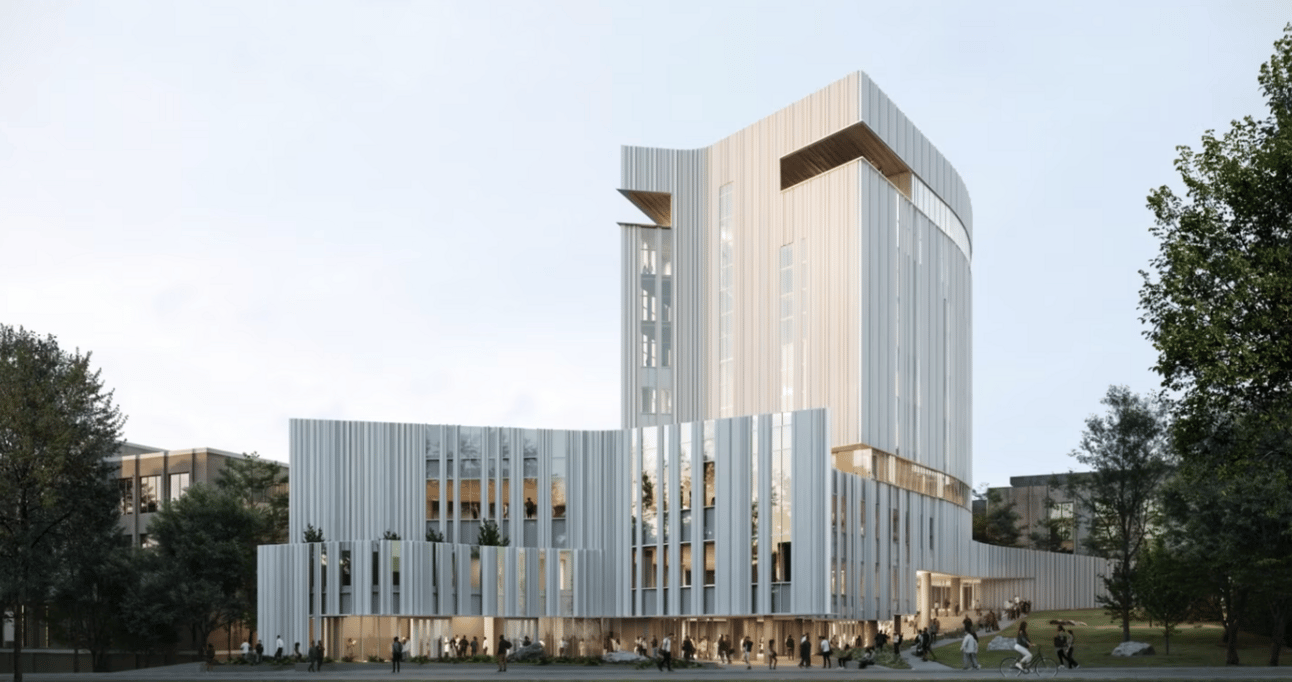
Artistic rendering of the new Powerhouse Project building. Photo: UBC Sauder
Clio, a global leader in cloud-based legaltech, has given a $3 million donation to UBC Sauder’s Powerhouse Project: a new, state-of-the-art building on the university campus dedicated to helping advance students’ experiential learning and connections with the business community. The gift is one of the largest donations to the project, and will fund a purpose-built space that will house the Vancouver branch of the Creative Destruction Lab (CDL).
CDL is a globally recognized nonprofit organization that delivers a mentorship program for scalable, seed-stage science and tech companies. The Vancouver CDL branch focuses on tech that improves human health and the environment, covering sectors like biomedical engineering, cancer treatments, computing, climate, and minerals. Clio’s donation, the company says, underscores a shared vision towards fostering local talent, innovation, and sustainable growth at UBC Sauder and across CDL’s programs.
"UBC Sauder is a catalyst for world-class talent, shaping the leaders who will define the next wave of transformation,” said Jack Newton, CEO and co-founder of Clio. “We are incredibly proud to support the Powerhouse Project — a space that will connect ambitious students, entrepreneurs, and industry leaders, sparking game-changing ideas with the discipline and rigor needed to transform industries for generations.”
The new CDL space within the Powerhouse building will support experiential learning through workshops, seminars, and accelerators, enabling students and startups to gain practical skills to scale their ventures. The location will feature flexible areas for new technologies and mentorship, and is set to become a catalyst for Vancouver innovation and entrepreneurship, says Darrell Kopke, executive director of CDL Vancouver and UBC Sauder lecturer.
“It’s not just about fostering ideas,” he suggests. “By bringing together students, faculty, and industry leaders, we’re creating an environment that empowers startups to scale, and creating opportunities for both students and entrepreneurs to address the challenges that matter to our communities.”
Paying it forward
Newton and fellow Clio co-founder Rian Gauvreau credit much of their success to the mentorship they received in their early days. The company’s gift is not just about funding a physical space, they say, but rather fostering an environment where students and young entrepreneurs can benefit from the same kind of support that helped Clio gain its global recognition.
The co-founders suggest that the initiative emphasizes the importance of cultivating local talent to compete on the global stage. By reducing reliance on hubs like Silicon Valley, Clio and UBC Sauder aim to support local talent, and foster an entrepreneurial ecosystem in the province that drives innovation and economic growth.
“British Columbia is home to incredible talent with the potential to lead on a global scale,” says Newton. “Fostering that talent here creates a stronger innovation ecosystem that benefits not only our province but the world. At Clio, we’re proud to invest in initiatives that ensure B.C. remains a hub for bold ideas and transformative leadership.”
“It’s an incredible privilege for Clio to partner with UBC,” agrees Gauvreau. “While Vancouver and B.C. provide an excellent foundation for building companies, our hope is that this collaboration between Clio and UBC’s exceptional ecosystem of students and businesses will cultivate the conditions necessary to drive innovation and economic success on a larger scale.”
Liking your free Vancouver Tech Journal content? There’s more to love when you become a member.
